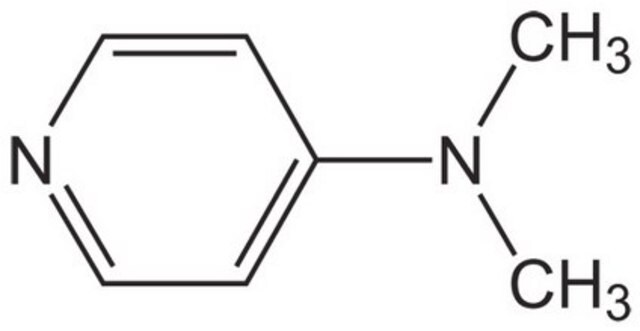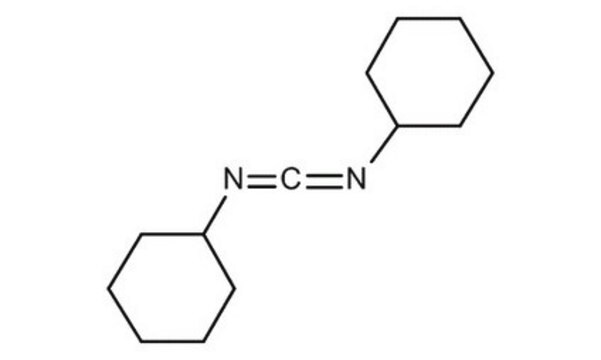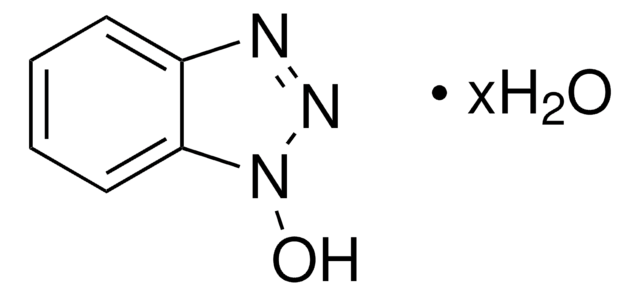D80002
DCC
99%
Synonym(s):
N,N′-Dicyclohexylcarbodiimide
About This Item
Recommended Products
Quality Level
Assay
99%
form
solid
reaction suitability
reaction type: Coupling Reactions
bp
122-124 °C/6 mmHg (lit.)
mp
34-35 °C (lit.)
SMILES string
C1CCC(CC1)N=C=NC2CCCCC2
InChI
1S/C13H22N2/c1-3-7-12(8-4-1)14-11-15-13-9-5-2-6-10-13/h12-13H,1-10H2
InChI key
QOSSAOTZNIDXMA-UHFFFAOYSA-N
Gene Information
human ... EPHX2(2053)
mouse ... Ephx2(13850)
Looking for similar products? Visit Product Comparison Guide
General description
Application
7-((tert-butyldimethylsilyl)oxy)hepta-2,4-diyn-1-ol with propiolic acid to form 7-((tert-butyldimethylsilyl)oxy)hepta-2,4-diyn-1-yl propynoate.
It can also used to synthesize:
- 1,3-Thiazetedine derivatives via [2+2] cycloaddition with 2-phenylethenyl- and 2-(4-nitrophenyl)ethenyl isothiocyanates.
- 1,3,5-Oxadiazine-4-thiones via [4+2] cycloaddition with benzoyl isothiocyanates.
- Sterically hindered 1,3,4-oxadiazole derivatives by reacting with (N-isocyanimino)triphenylphosphorane in the presence of aromatic (or heteroaromatic) carboxylic acids.
Signal Word
Danger
Hazard Statements
Precautionary Statements
Hazard Classifications
Acute Tox. 3 Dermal - Acute Tox. 4 Oral - Eye Dam. 1 - Skin Sens. 1
Storage Class Code
6.1D - Non-combustible acute toxic Cat.3 / toxic hazardous materials or hazardous materials causing chronic effects
WGK
WGK 3
Flash Point(F)
235.4 °F - closed cup
Flash Point(C)
113 °C - closed cup
Personal Protective Equipment
Regulatory Listings
Regulatory Listings are mainly provided for chemical products. Only limited information can be provided here for non-chemical products. No entry means none of the components are listed. It is the user’s obligation to ensure the safe and legal use of the product.
ISHL Indicated Name
Substances Subject to be Indicated Names
ISHL Notified Names
Substances Subject to be Notified Names
JAN Code
D80002-25G:
D80002-BULK:
D80002-1KG-CH:
D80002-CH:
D80002-10KG:
D80002-1KG:
D80002-5KG:
D80002-18KG:
D80002-VAR:
D80002-500G:
D80002-100G:
D80002-15KG:
Choose from one of the most recent versions:
Already Own This Product?
Find documentation for the products that you have recently purchased in the Document Library.
Customers Also Viewed
Articles
Professor Aran discusses engineering graphene-based materials through careful functionalization, enabling diverse applications.
Our team of scientists has experience in all areas of research including Life Science, Material Science, Chemical Synthesis, Chromatography, Analytical and many others.
Contact Technical Service











